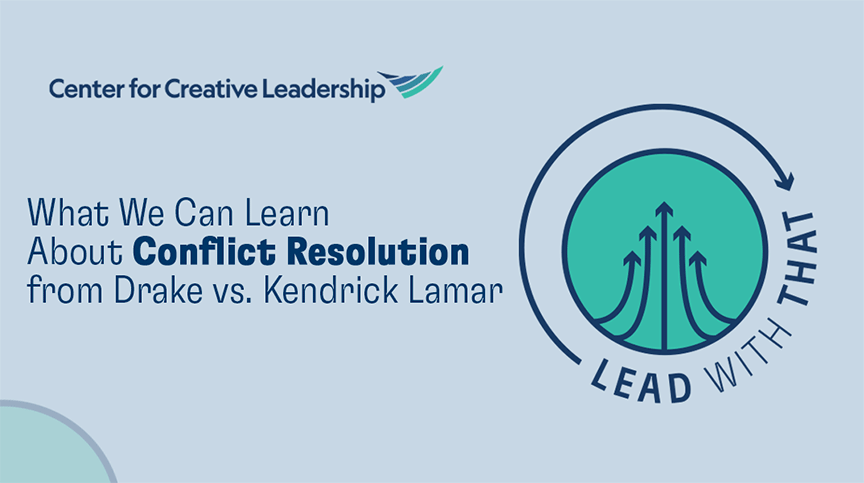- PODCAST
Lead With That: What We Can Learn About Conflict Resolution From Drake vs. Kendrick Lamar

In this episode of Lead With That, Ren and Allison discuss the climax of the ongoing rivalry between music artists Drake and Kendrick Lamar. After years of alluding to each other in their music, the feud came to a head when they shifted to air their grievances directly, a common aspect of hip-hop music culture. While both are well known for being influential artists and leaders, their duel has raised questions surrounding the impact of self-expression during times of conflict, especially in the workplace. While there is value in being able to express frustrations freely, this rivalry highlights why finding middle ground using constructive conversations for conflict resolution is the best route for leaders to take, especially during tough situations at work.
Listen to the Podcast
In this episode, Ren and Allison explore the ongoing feud between Drake and Kendrick Lamar. While both are hugely influential artists partaking in an aspect of hip-hop culture, their clash highlights the importance of conflict resolution, especially for leaders in the workplace. Ren and Allison explore what we can learn from this conversation from a leadership perspective, and lead with that.
Interview Transcript
INTRO:
And welcome back to CCL’s podcast, Lead With That, where we talk current events in pop culture to look at where leadership is happening and what’s happening with leadership. Maybe you’ve heard about it, maybe you’ve not, and you might not even know who the winner is, but it looks like the dust has settled for now. That’s right. This week, we talk Kendrick Lamar and Drake.
Ren:
Now, at first, I wasn’t picking sides, but maybe I am now, not for any reason related to their beef. I’ll tell you later, though, Allison. But my son surely has an opinion about who’s right and who won. And it sounds like the music industry and the world has an opinion too. Now, while you can track this beef back to 2013 in Kendrick’s verse on Big Sean’s track, “Control,” the temperature 10 years later is hotter than ever.
Who would’ve thought alluding to a Mount Rushmore of rap would cause so much hate, but Kendrick wasn’t having it. After artists J. Cole and Drake linked up for a track, “First Person Shooter,” in October last year, J. Cole alluded to he, Drake and Kendrick holding it down as the big 3. Kendrick disagreed. And this March on Future & Metro Boomin’s track “Like That,” Kendrick reminded us, “Mother blanker the big 3, people, it’s just the big me.”
Now, I’ve taken some artistic liberties with the quote, but I think you get the vibe. Kendrick was saying, “I’m the big dog, not any of you.” And so, why are we talking about something that was released in March? Because it’s still happening. And with the timeline the way it is, it might still go on. Not sure if you saw, but even Tom Hanks reached out to his sons, talking about, “Hey, man, what’s going on with this beef?”
So today, we’re probably not going to be able to read through the lyrics or explore some of these other concepts, but we will look at some big concepts that always come up between people and in leadership. Is all fair in love and war? Are there certain things one can say and do in battle? What about in leadership? What lines cannot be crossed?
And what does success look like in this whole thing? Some industry insiders suggest this rivalry is not about ego, but it’s really about pushing each other to new heights. That’s a really cruel way to do that, I think. It seems like it’s a competition, though, that’s led to some of the best music of their careers. As for who the public sees who the winner is, a lot of people are leaning towards Kendrick.
It seems like his wordplay, his challenges, have resonated with many fans, but Drake is one of the most famous and influential people in the world. So, I think the battle rages on, but we’re going to talk a little bit more about it today and how you might take some leadership ideas away from our newest cultural rap beef.
So, welcome back, everyone. I’m Ren Washington, and as usual, I’m joined with Allison Barr. Allison, whose side are you on?
Allison:
Ren, I’m operating as Switzerland here on this topic.
Ren:
You’re neutral?
Allison:
I’m neutral.
Ren:
You’re not neutral.
Allison:
I’m neutral.
Ren:
You’ve got to choose.
Allison:
No.
Ren:
What do you mean, no?
Allison:
I’m neutral.
Ren:
That’s hard right now.
Allison:
I know, but I laughed when you made that comment about Tom Hanks because it’s hilarious, and also I had a conversation with my friend Kelly today. So, Kelly, if you’re listening, thank you for the laugh, because you can also ask Siri and Alexa who the winner is, and collectively, they both agree that it’s Kendrick. So, what about you?
Ren:
Do they say why they agree?
Allison:
No, but I’m sure you could probably push it, I bet, and ask them why, which we didn’t do. Missed opportunity.
Ren:
Well, there’s part of me that wants to probe about why you’re trying to maintain neutrality.
Allison:
You can.
Ren:
Well then, why are you trying to maintain neutrality?
Allison:
I’m not trying. I am. I think there’s a couple of reasons. Objectively speaking, it’s a “feud” in which there are lots of people in the world who are watching and commenting. It’s probably a very smart marketing move for both of them. Regardless, you and I and the world will never know every detail of the whole truth. So, that’s the first part. I’m just never going to know the whole truth.
And then, the second part of it was, as I was preparing for this podcast, I found a little bit about the history of hip-hop and rap battles, and these battles have been existing actually before the existence of rap recordings. And so, there’s a cultural part of this as well. That’s simply that. It’s cultural. So, as far as I know and as far as I have found, this type of battle, if you will, has always been a component of music and expression specifically in the hip-hop world.
So that’s why I’m neutral about it, because it’s 2 artists who are expressing themselves … 3, if you want to count … well, there’s probably more than that, but if we’re just talking Kendrick and Drake, 2 of them.
Ren:
Yeah. Well, sadly for J. Cole, I think he’s confirmed Kendrick’s idea that, “Yeah, in fact, you’re not even in the conversation,” and it’s just Kendrick and Drake. I think I’m Team Kendrick, everybody. That’s right. @Allison; don’t @me. But I think the part of my reason is simply because I was listening to Kendrick reflect on existence the other day and just about life as an experience, and I found his reflections to be thoughtful and personally resonant and relevant for me at the time.
And so, I was like, “You know what? I’m Team Kendrick now.” Not because I’ve been tracking the songs at all or really that I care. And also, I’m not really worried about any one of the fan groups coming for me. But there’s something about, maybe, and this might speak to why people are leaning towards Kendrick and maybe some of the things that we can explore today, is this idea of perspective.
And I think Kendrick has a certain perspective that I appreciate. And so, because of that reason, Team Kendrick.
Allison:
Okay. Well, I’m curious to explore that a little bit more. And I would say there are 2 things that came up for me specifically around this story. And the first one, surprisingly, is about AI. And the other one is really around having the ability to express yourself safely, especially when it comes to conflict.
And our world of work and leadership development is not the music industry, so how can we translate that? Again, we don’t know what’s going on or has gone on behind closed doors, and the public and fans exacerbate all types of things when it comes to that industry. So, translating it to our worlds, I think it’s complicated. And part of me really wonders if the systemic nature of the workplace prevents us from effective conflict resolution. So, that’s where my brain went.
Ren:
So, is this rap feud, and the way it’s kind of slowed for now, would you consider this effective conflict resolution?
Allison:
Well, I don’t know if that was the goal.
Ren:
For whom? For those 2?
Allison:
Right. For those 2.
Ren:
Well, I think we … I actually might push back a little bit. I think both of them were pretty damn determined to end this conflict now. Was it like —
Allison:
Was it to end the conflict, or was it to be known as number 1? That’s different.
Ren:
Well, is it? Think about the pugilist society that we exist in, in any kind of sporting event, the winner stands and the loser lies defeated. So, I think, yeah, knocking out your opposition is effective conflict resolution for this group.
Allison:
Well, I don’t want to get too philosophical on you, but playing a sporting event has nothing to do with conflict. It’s a game.
Ren:
Well, let’s get philosophical. I guess, how might you define conflict?
Allison:
How might you define conflict?
Ren:
Well, I would say 2 opposing sides competing over the same thing.
Allison:
Do you think it’s competing? So, if you hurt my feelings and say something that hurts my feelings, what is the competition?
Ren:
Typically, and this is actually fun, because I’m out here in business as we know, traveling around the world, and we just had a conversation … we’re doing our Better Conversations Every Day framework and talking about this idea of discussion. And I often think people are in conflict, especially in my world, in my personal life, but also my professional life, where you and I are competing over whose perception is right.
Allison:
Interesting.
Ren:
I get stuck and I’m like, “Allison, no, this is how I’m feeling. Don’t you understand?” And think about it. I’m always trying to push my perception versus trying to gain some perspective. So, I guess in that instance, if I harm you, the competition would be naturally maybe in the human dynamic to say, “Hey, but this is why, because I was wounded. Can you understand why I do that?” So, maybe that’s my answer.
Allison:
So, I’m hard-pressed to think that Kendrick and Drake want to understand each other better. Maybe I’m wrong.
Ren:
Is that because of the way … Well, why do you think that?
Allison:
That’s a great question. Let me take it back to a more tangible example. If I feel harmed by you or whomever, it’s more about my relationship to you, and me wanting to have a healthy relationship with you. So, I don’t perceive any competition in that space. It is that I feel hurt. This is made up so it’s a little hard, but I’m feeling hurt and I want to have a good relationship with you, and how do we move forward?
It’s about both of us being able to move forward in a way that we both feel resolved. It’s not one or the other.
Ren:
And see what conjures, what that brings up for me, is I actually think these guys need to be okay with themselves.
Allison:
Ren?
Ren:
For real. Think about it. Why react? And think about yourself, too, in the leadership context, or even you, Allison, as you chuckle at the idea. But imagine if you had more peace with yourself, then what would it matter if someone said something about you? So, too, in a leadership context, and again, we were just talking about this in our Better Conversations idea, it’s like, when people give you feedback, they’re really teaching you and telling you about themselves.
I’m not condemning your character or your humanity when I give you feedback. What I’m telling you is that, “Hey, this is who I am and I need this from you.” And so, I think maybe less about how we need to make peace with each other. But maybe these guys, yeah, like you’re saying, they’re not needing to make peace with one another, but they clearly seem to be needing to make peace with themselves.
But that seemed to elicit a little chuckle from you. Tell me more. Is that too meta?
Allison:
Well, you couldn’t possibly know that. That’s, with all due respect, a very bold statement to make. That’s —
Ren:
I don’t know.
Allison:
You couldn’t possibly know what drives an artist, 2 very well respected and successful artists.
Ren:
Fair enough.
Allison:
You won’t know what’s behind that. And so, again, when I think about translating that to the workplace, that’s incredibly relevant because what you just said, if Sam and Joe don’t like each other and Sam happens to be your best friend, what happens at the workplace is that Sam is going to rally you to also not like Joe. That happens. You will not convince me that doesn’t happen.
And so, when I think again about translating it to work, how easy it is to cause an environment that is chaotic and awful when it doesn’t have to be that way.
Ren:
And I guess, even, I agree because I don’t think Sam would do that if Sam had some perspective about their experience. They wouldn’t have to rally the troops against their seen enemy.
And I think that’s so often what we experience is that, the Kendrick and Drake experience is the worst kind of workplace conflict, where conflict resolution is the absolute defeat of my enemy. It’s cruel, it’s callous. There’s no humanity. Emotional intelligence is low. And it’s like this barbs and fight and caustic conversation, real toxic stuff.
But I also think most of my experience … Now, you’re right, I can’t determine what an artist is doing, but I can tell you this. The people who I’ve seen that seem to be, like, the most resolute, the most resilient, the most grounded in themselves are the most unflappable, the most able to withstand and actually be like, “Oh, I see multiple truths and maybe I do have some space to grow.”
And so, I do think there’s some space. If you’re okay with yourself, then what incentive is it to push back to someone else’s perspective of you?
Allison:
Well, I think we’re probably accidentally minimizing what conflict means for people, because that’s one example. But there’s all types of different conflict and all types of different reasons that people may feel rattled, or upset, or in your words, you said unflappable, whatever the opposite of that is, rattled, I suppose. And I think —
Ren:
Flappable, I guess.
Allison:
Flappable. And I think that can minimize people’s experience and what their truth is. So, giving feedback is one example. You’re giving some examples, but do you think that the work world has a system that supports conflict resolution?
Ren:
Do I think the work world has a system that supports conflict resolution? No, probably not, like, a singular approach, because I don’t know if there is a singular approach to conflict.
Now, I don’t think an SBI conversation would be good for Kendrick Lamar to have and say, “Hey, when you said this in that song, it really hurt my feelings. And the impact on me is now I’m building a diss track.” I don’t know if there’s really space to have that kind of discussion.
So, I think it’s kind of right time, right place, or what does your environment call for? And maybe, too, we’ve got to look at what are we perpetuating in that space? So, it always, for me, I think most recently too, coming back to reward and incentive.
Allison:
Indeed.
Ren:
What are people rewarded or incentivized to do? Kendrick and Drake were not rewarded or incentivized to mend bridges. They’re rewarded and incentivized to have this fight, and it pays off. So, I think there’s probably not a standard conflict resolution model, but I do think people might be more aware of the way they resolve conflict in their workspace than they think. I don’t know. Does that make any sense?
Allison:
Yes. And in theory, we do expect people to come to the workplace and do their jobs. And I think a lot of times people just, generally speaking, forget that there’s a human component to it and there’s going to be conflict, period. End of story, period. And in theory, people will perceive HR as a place to go for coaching if they need it when it comes to conflict. And of course, that’s not all that HR does. So, if you’re in HR, I know that’s not all that you do.
However, the system, what I mean by system is that the system of HR can only take you so far, because HR, just like the rest of us, are beholden to legal and employment law, and at work — so, you got me thinking about this — because at work, if we do something “wrong,” depending on the context, the consequences are potentially too great to admit wrongdoing. So, you might not resolve conflict at the workplace for that reason.
Ren:
Well, what a great — actually, what a demonstration of this fight between Kendrick and Drake. The ability to admit wrongdoing is a courageous and sometimes dangerous act. Sometimes, like you’re saying, in a legal context, “Oh, gosh, we made a mistake, but we can’t admit wrong now because the suits are coming.”
But I think, often in relationships, when there is no actual legalese punishment coming your way, it’s just the punishment of maybe having to admit you’re wrong, or dealing with that expenditure of interpersonal cachet when you admit that you’re wrong, that thing is going on. And these guys too, they’re not in a position to admit wrong, and it would be dangerous to do so.
I think the way a normal person, you, me, anyone who’s listening, can take away from that, is that admitting wrongdoing is actually something that adds to your capital versus takes away. We know in the context of trust building, in the context of team building, admitting wrongdoing is a great way to forge connection.
But I think we’re so scared of the risk, and I know you were talking a little bit more legal, but I think people feel the same way. They’re like, “Yo, I can’t afford to say sorry. What does that mean about me?”
Allison:
Right. And it’s the same context, and it can make work conflict, when we’re talking about the organization, can make conflict very complicated, because workplaces have a culture of punishment for wrongdoing. And I’m not saying that’s right, wrong or bad. It’s just it is what it is. That’s across the board, regardless of industry.
And the reason we do is because of a much larger system that we’re both talking about, like legal, economics, policy, et cetera. But it just got me thinking about, this can be a reason why people take work so personally, because sometimes you might not get the resolution that you really need to move forward, based on the things that you mentioned and that I mentioned. So then, what?
Ren:
Well, forgive me, I’m going to keep going back to this well, but the reason we take things personal is because we personally identify with things. And so, in the scope of conflict, let’s say you and I have conflict about this podcast. You disagree with me or think that I’m underperforming.
If I identified, or if I was codependent in this relationship, or your opinion of me or your affirmation of me required my success, then I would have this halted, this stop, this start kind of experience. And so, I think maybe in all of this conflict space, it’s how can I just recognize that things are persistent, that maybe there is no necessary resolution. A lot of conflict, I think too, is a polarity.
It’s challenges to manage versus problems to solve, especially as it relates to complex human dynamics. I don’t know if we’re ever going to solve the problem of the ebb and flow we need to have for your needs and my needs.
Allison:
Yes. And I’m going to just take us a bit further, too, in that yes, what you are explaining is conflict. However, there are other types of intentional conflict, intentional, I mean, that really dramatically impact people’s lives.
So, here are things that I’ve heard from clients before. These are not made up stories. “My boss took credit for my work and got a promotion where I should have gotten that promotion.”
That’s not as easy to say, “Well, I identify that. That’s rainbows and butterflies. Okay, let’s just bypass. Let’s just bypass that that was an intentional effort with a consequence to that person.” That’s pretty impactful.
Ren:
I’d say let’s go both/and. I’m sticking with the polarity. I don’t want to devalue the person’s experience of having their work stolen and someone else taking credit. And I think a major source of marching forward, that person has some options.
They could shrug, they could say boo. They could rattle their sabre, shake their fist, and say, “Does anyone see the wrongdoing that’s happening to me?” And how many clients have we talked about, where that works for them?
I think there’s probably a truth that, “Hey, you aren’t this thing.” I think maybe the idea is like this thing, this person’s stealing from you. That is not representative of you or your character, because bad things happen to you or that bad thing happened to you doesn’t make you a bad person or ineffective.
And I guess the biggest elevated area, the biggest kind of stakeholding you could do is, what would it look like to take empathy for the perspective of someone you really dislike?
Allison:
Ooh, okay. I’m going to pause you because that’s interesting. I’m going to pause you if that’s okay.
Ren:
Please.
Allison:
Do you think it’s ethical to take somebody’s work and then receive the benefits of taking said person’s work?
Ren:
No. But why?
Allison:
So, you would tell a client you should have empathy for that person? Just clarifying.
Ren:
What I would tell a client is empathy is a liberator. It’s a liberator for you, and it might be a bridge builder for that. We talked conflict resolution or real trust-breaking things, like you’re talking about. Someone’s stealing your idea and then getting a promotion.
There is a legitimate conversation that I think is worth having about understanding why that person did it, if only in the context of The Art of War and Lao Tzu and “keep your enemies close,” and “keep your friend close and your enemy closer,” if only to encourage and expand your understanding of why someone slighted you.
But I really believe, regardless of the ethics of that decision, I know that it would be empathic and maybe compassionate to try to understand why that happened.
Allison:
Because? Tell me more, why is that important?
Ren:
Because it’s an act of empathy. Empathy is cultivating an understanding and an awareness about why that thing happened. And then even —
Allison:
Okay. So, client understands that boss, whomever, stole the work because they really wanted a promotion. That’s why.
Ren:
I think that’s … Sure, I guess if you would stop the human desire at “I just wanted a promotion.” Now, I could imagine a story where I just need a promotion because my partner just left me, or my relationship has ended with so-and-so, or maybe a parent just died and I’ve got kids, or I’ve got a mortgage, or a countless amount of infinite reasons humans do what they do. Or, like I said, why they feel wounded.
It could very well be, like you said, someone’s working in an organization for a long time, a new high performer gets in there, they’re kicking ass and the person’s like, “Oh, my God. No, I’ve been here for years and this person keeps on winning. Oh, they have this brilliant idea,” and this person takes credit for it. And the high performer’s like, “What the hell? Why should I have empathy for this person?”
And I’m not saying any of you should, but what I’m saying is, here’s my counter, Allison: without empathy, you got Kendrick and Drake.
Allison:
Ooh, that’s a bold claim.
Ren:
Do you see a lot of empathy in their conversation?
Allison:
What conversations are you seeing and hearing?
Ren:
Well, they have been going back and forth for songs for a decade, but most recently, from —
Allison:
No, what conversations, though, are you hearing and seeing between the 2 of them?
Ren:
The songs, the barbs that they’re throwing back and forth at each other, where they’re talking about, whether it’s, “Yeah, you talking this stuff or X, Y and Z.” Or, “Let me tell you who the real boss is.” Or, “Hey, why is your wife cheating on you?” Or, “Hey, you’ve had this bad relationship with your children.” Now granted, it might not be the healthiest conversation I’ve ever seen, but the idea is they’re not talking at a coffee shop, they’re exchanging messages through their music.
And so, in that conversation, they’re not demonstrating empathy. I don’t see it. They’re demonstrating a lot of hate, vitriol, pain, suffering, pride, ego … maybe some artistry, too, but it doesn’t seem like they’re having a healthy conversation.
Allison:
Well, and again, this goes back to what I said at the beginning, there’s a cultural component to this that is no comparison. It’s just no comparison to the workplace. And you don’t know. You just don’t know. You don’t know what drives them to be doing what they’re doing, and you don’t know what conversations are happening. You actually don’t. You know what music is being produced.
Ren:
Sure. And maybe they’re talking, maybe they’re having a discussion. I think that’s a good reminder though, but I would say, too, that what I do know is my experience. And as a listener, as a consumer of media, as a podcaster, as your partner on the show, I’m being impacted by their behavior. And I can only judge them on the behavior I see.
Heads up for any of you listening, it doesn’t matter what conversations are happening behind closed doors, it doesn’t matter what your intent is, if the people around you are being impacted a certain way by your behavior, then I don’t know if it’s your place to be like, “Hey, you don’t actually know what’s happening.” That might be the case, but I do know what’s happening with me.
And so, just from my point of view, I do think there are some parallels to the workspace, which is to say, conversations that lack empathy create more volatility.
Allison:
So, just feeding back to you what you mentioned a moment ago, you’re being impacted. Where can you have empathy?
Ren:
I think I practice empathy by looking at what they’re saying to each other and not judging them as the worst human beings, because they have said some very callous things to one another. And I think some of what you’re saying is right. I think there is some pushing back and forth. There is some barbs and there is some hyperbole going on, and a lot of wild stuff has been said. And maybe it’s kind of like “all is fair in love and war,” and they love their music and they’re warring with each other.
And so, I think I have an understanding of that. I think culturally, like you’ve said, I have empathy for … There’s not a lot of space for acceptance, vulnerability, admitting you’re wrong in this culture. And so, I understand why no one’s taking the higher road. You know what I mean? I get it.
Allison:
Yeah. Yeah, that’s a great point. And that’s well stated for the workplace too, exactly what you just said was what I was alluding to. It’s a question to ask yourself, if you are a leader, are you creating a space where there’s room for that vulnerability that you just mentioned, and mistake-making, and admitting wrong? We’ve talked about psychological safety. I don’t want to overdo that conversation.
However, it is inevitable that conflict’s going to happen at the workplace, period. So, it is really about, for a leader, what kind of environment you are creating, given some of the variables that I mentioned earlier around punishment, work laws, employment laws, policies, et cetera. How can you create an environment at the workplace for meaningful resolution when you have some of those barriers?
Ren:
Is that rhetorical or specific?
Allison:
Both.
Ren:
Yeah. Well, I think that’s maybe where we can start to head, is when we think about conflict resolution, and maybe that’s where this moved to for us, as a practical exploration. I think there’s probably some watch-outs for you that perspective is really important. Fighting for your perception, trying to convince someone that you’re right, at least I can say personally, tends to lead to someone else trying to convince me that they’re right.
And so, maybe in that conflict space, I’ll stick with empathy. Maybe my first answer to you would be, what are you doing to demonstrate your understanding of another person’s point of view, especially if you’re the righteously wounded party?
Because I think something we talk about in trust rebuilding is … a couple of things have to happen. One, I think really someone needs to say sorry; 2, both parties need to recognize their role in the reality; and then, 3, the person who is wounded has got to be willing to come back to the table. And so, a good way to come back to the table maybe is to practice empathy. “Why could that person have done that thing to me? Could I understand why?” That might be a first bridge back to connection.
Allison:
Yeah. And I think too, the apology is sometimes, I’d say almost always, necessary depending on the person. It just depends. Changed behavior is better. And so, it does depend on context. It certainly depends on context. So, I gave one example, you gave another example. There’s so many examples of why conflict could occur.
And, in the example of claiming that your work is yours when it was actually somebody else’s, that could look like taking ownership or giving credit where credit is due. So, I think apology, yes, and then there’s changed behavior or an action that comes with that, too. And it’s tricky because, in a perfect world, I would suggest that whomever you are having tensions with or conflict, in a perfect world, you would go to that person at the workplace.
I also understand why you wouldn’t, in some cases. So, it’s a little bit tricky. But I would say, in your perfect world scenario, if I am having conflict with you, Ren, I’m going to come to you, because we have a relationship and I know I can talk to you, versus me going to your boss, or going to HR, or telling all my friends to blacklist you or whatever it might be. It is tricky. It’s tricky.
Ren:
Well, let’s stay with the tricky, and let’s say that we’re Kendrick and Drake, or you’re in that situation. What’s a way that someone might begin to think about opening their heart to resolving conflict as the wounded party? And too often, I think we know in human dynamics, often people both feel wounded because there’s that need to prove ourselves, to keep ourselves psychologically safe, and so often we both feel hurt.
But as the righteously wounded party in an instance, what’s some advice you could give to someone in the workspace to begin to be willing to mend a relationship? So, not the person who’s like, “Hey, admit you’re wrong, and then have a tough conversation.” But being the person who’s been wronged, how can you even open yourself back up to trusting again? What would you say?
Allison:
I’m trying to think about the last time I had a conflict that was resolved, and what happened was, as the “wounded,” that feels like too strong of a word, but I’ll go with it. I’ll go with it.
Ren:
The wronged party, whatever you want to call it, the one who was wronged or something.
Allison:
It was an objective … So, first step for me was to process, and I think that’s understated and very important, because I was upset. I was very upset and angry. And with that unprocessed anger, it would be hard for me to resolve if that’s what I wanted. So, it was for me about taking the time to process before I had a conversation. And then, from there, the conversation was incredibly objective.
“When you said this, it was in an email, so it’s right here. When you put this in an email and copied 6 people on it, I felt really embarrassed and ashamed, and I wondered why you did that.” And that was the conversation. So, I think this is, too … You brought up SBI, which is situation-behavior-impact. And SBI is a great starting-off tool, but it’s not a mic drop. It’s an open door to the conversation.
And then, I got perspective. I did get perspective. So, I think that’s where you start. But then, Ren, what would you say then, if the opposing person … so this person was very receptive. What would you say then if the other person’s not receptive?
Ren:
Well, this is where some of my personal philosophy around self-reliance and fierce accountability comes from, is that if I’m dealing with someone who refuses to take acceptance or accountability for their behavior, the only thing I can do is look at what I’ve done to either give them the right to wrong me or to perpetuate an environment where they can.
Now, I know that might be an oversimplification, and this is something I think you and I will continue to be able to explore, that balance between self-reliance and self-accountability versus … especially if you’re systemically righteously wronged, it’s hard to look at somebody and be like, “Well, take accountability for yourself.” But I also think that if you’re looking at a system or a person who refuses to recognize, who is unable maybe, just incapable of seeing their role in it, then maybe I’ve got to ask myself the plain question, “Why is this person still in my life?”
That could be a legit question. “Why am I still working on this project with this person knowing that they cannot see past their contribution to our experience, regardless of the feedback or the teams around them or the 360-degree assessments?” And so, maybe there’s some of this, “Well, maybe I continue to perpetuate this wrongdoing because I don’t stand up to this person, or I don’t give them better feedback.”
So, I would say if they refuse to recognize their role, then the only thing left for me is to recognize, “What am I doing to perpetuate that communication, even if it’s only just enabling them to continue to be ignorant?” Then I got to be like, “I got to stop that off.” I don’t know.
Allison:
What if it’s your boss? I hear you. You’re right, asking that question. So, let me restart what I’m saying. So, there’s punishment and then there are natural consequences. Punishment is exactly what it is. A natural consequence for wrongdoing or harming somebody very well might be, “This is unforgivable, or I’m unable to move past this because this is a pattern for you, and I will choose to not have you closely in my life,” for example.
That’s a natural consequence. Or a natural consequence is, “Please change your behavior.” Or a natural consequence is, “Can you please give me … you need to give me credit for my work if that’s actually my transcript that you turned into a book,” for example. Those are natural consequences. However, again, I don’t mean to overstate this point, but at the workplace, that becomes very complicated.
This could be your boss, and you might coach someone to then talk to a supervisor and see if you can get a new boss. There are possibilities, but then my whole point is that it becomes very complicated to do what you’re saying.
Ren:
Yeah. It’s not going to be easy. And the stuff that I’m talking about, too, people have been exploring philosophically, religiously, academically for thousands of years, this idea simply that … no one can make you feel inferior unless you give them permission. That’s an Eleanor Roosevelt quote.
And I think it’s the idea that we have a lot of control. Even in that instance — You’re my boss, I’m stuck in a job that I must have because I’ve got to take care of my family, and you keep wronging me, but I can’t go anywhere. Then at some point, you’ve got to cultivate some safety, knowing someone’s going to come knock down your walls every single day. And if you have no option but to withstand, then you’ve got to cultivate some kind of ability to withstand.
Or I think what happens to a lot of people is they start to believe that story about themselves. They start to believe that they aren’t enough, that they can’t do it, that they are this thing that this person keeps on telling them. And so, I know, it’s not easy. It’s not easy, and it sounds so Pollyanna-ish maybe, but I don’t think it is. I think it’s like a root of a lot of these ideas of real, whether it’s stoic philosophy or any idea of peace and serenity.
I think it comes from, in part, within. Especially if you can’t control your environment. But maybe you have to adjust your sails.
Allison:
Right. Yeah, and I agree with you. And last episode, we talked about controlling what you can control. We started to talk about that. And in this respect, too, if it does get this bad, if it does get to that extreme, it is asking yourself, “What can I control?” And can you control who knows what work you’re doing? Can you control your own personal brand? Can you control who you connect with? Can you control your relationships? Can you control, again, who has visibility into the work you’re doing?
This could derail us. I’m going to say it anyway. But part of what was interesting to me about this, too, is that there’s a whole new obstacle that we might have to look at, too, that’s interesting within this, is because somebody made a fake Kendrick response. I don’t know if you saw that.
And it was a short little clip and it was AI-driven. And if you didn’t look closely enough or you’re not familiar with his tone or his way of performing, you might not catch onto it. It was AI-generated. And so, there’s part of that that we do need to be aware of, too, in that someone could … not someone, AI I suppose, someone could use AI to take your ideas and spin them to your own as well.
So, again, I don’t mean to derail us, but only to say that leaders do need to be aware of that, too, from a business standpoint and from a personal protection standpoint, too, being aware that someone could very well take your personal IP and spin it to their own. And that’s conflict in a whole way, because how do you fight that?
Ren:
Well, actually, I think that’s a great segue to maybe a takeaway for anyone listening, and it is actually really resonant. You said, if you’re not aware of Kendrick, or his tone, or who he is, or his messages, then you would interpret that as truth. And that’s some of the story here. It’s like, what are you doing to make sure that — you already called it out — Who knows the value of your work?
If someone keeps stealing your work, you probably have an opportunity to expand the visibility around the work you’re doing. And that’s what happens to a lot of hard-working people who just tell me, “Dude, I just want my work to speak for itself.” Not when there’s a whole bunch of vultures out there trying to speak for your work.
And so, you got to know, shine a light on what you’re doing. And it’s not bragging, but it’s letting more people know about what you’re doing so more people know what you stand for. So, one day, if someone is sniping my voice on AI, and I’m saying a whole bunch of wild stuff about how I love corporate sabotage of people’s careers, and, “I only vote for robo emails,” if someone’s going to clip that, you got to know, “Wait a minute, that doesn’t make sense because we heard him say, on countless podcasts, that that’s not his vibe.”
And so, I actually think it’s a really smart thing in this conflict, too. Or if you feel disempowered in the face of conflict, is tell more people what you’re up to. Let more people in on your experience, your development. Show more of your work so more people know what you stand for, and then maybe they can do the cover for you.
Allison:
Right. Yeah, and I think everything that you just said … So, I won’t be repetitive because I agree with what I said and what you’ve just said, in that understanding technology — you don’t need to be an expert in technology but — a leader in the workplace … actually this is anybody, literally anybody in the world needs to understand that technology can skew things.
Technology is a blessing and a curse. A friend of mine who is in the music industry educated me that technology is almost always used in music, even in “live performances.” There’s technology in microphones to pitch correct, et cetera, et cetera, et cetera. But I think how that translates to the workplace is that we sometimes need to determine what’s real and what’s not real.
A lot of us use LinkedIn. A lot of us use podcasts. A lot of us use research articles, and so on and so forth. So, it’s just worth a quick revisit, as the advancement of technology is moving super rapidly, to understand that your capabilities might need to change, will need to change, rather, in the age of technology. So, understanding technical capabilities is one thing.
And I really think that learning ethics and learning them early in your career, as early as possible, will be very helpful, and media literacy. So, I know I just sort of jumped topics, but it’s all relevant because it can cause conflict if you’re not on top of those things. It can cause major conflict, and it can cause organizations’ downfall as well if we’re not on top of those things.
Ren:
Yeah. And I’ll spare the idea of whose ethics are most ethical for another conversation.
Allison:
I knew you were going to say that. I knew it, that’s why I saved it til the end.
Ren:
But I do like the idea of … I think we’re aligned. Get clear on what everyone wants to stand by and operate by. Technical savvy is going to really help you navigate these things. And then, just keep navigating yourself, people. Don’t let the barbs, don’t let the stones and rocks of other people hurt you.
I actually have a quote in my office. Maybe just like … “A strong man can build a foundation off of the rocks that others throw at them,” and it’s this idea, then, that … let them say what they have to, and I’m here to do the work that I want to do. But maybe those guys are doing that.
Allison:
Is that in your office?
Ren:
Yeah, it used to be. It’s now, I think, a quote on my LinkedIn page maybe.
Allison:
Okay. Nice. Yeah, so I guess my takeaway to reground people is back to controlling what you can control, and especially when it comes to conflict in the workplace, make sure you let people know who you are, what kind of work you’re doing. And just to remember, for those of you who are hesitant to do that, it’s simply you being honest.
So long as you’re being honest, I think a lot of people can perceive that as being show-off or self-centered. However, if you don’t tell people what you’re capable of, they will not know what you’re capable of, number 1. And number 2, you are in charge of creating your personal brand.
Ren:
So, amen that.
Allison:
Well, this episode went a direction that I didn’t think it would, and I’m glad for that. I always love our conversations, Ren. So, thank you. And to our team at CCL who works behind the scenes, also a big thank you for helping us to make these podcasts happen. To our listeners, find us on LinkedIn. You can respond to any part of this that you want.
You want to tell us who won between Kendrick and Drake? Great. Do you want to tell us what you think about conflict resolution? We’d love to hear that too, as well as AI. You can also let us know what you want us to talk about next. And you can find all of our show notes and podcast episodes on ccl.org. And we will look forward to tuning in next time. Thanks, everyone.
Ren:
Thanks, everyone. Yeah. Do me a favor. Just email CCL or just LinkedIn them one word, Kendrick or Drake. That’s it. Just do that for me, because they’re very, very particular about professional only, but just hit them up with Kendrick or Drake. Thanks, Allison. I appreciate it. Thanks, everybody. We’ll see you next time. Find Allison on TikTok. She picks Kendrick, by the way.
| Related Solutions
Sign Up for Newsletters
Don’t miss a single insight! Get our latest cutting-edge, research-based leadership content sent directly to your inbox.









